Foreword
I am delighted to write the foreword for this remarkable and important report by my friend and colleague Ari Heistein. Ari has drafted or co-written a series of high-impact papers about the de facto Houthi regime that occupies Sanaa and a large part of Yemen, including most of the Red Sea coast. The value of Ari's research is difficult to overstate, at a time when the world has been taken by surprise by the Houthi assault on freedom of navigation in the Red Sea, damaging global trade, impacting world prices and decimating the Suez Canal revenues that are crucial to the Egyptian economy. They have also made themselves a cause célèbre amongst the type of Westerners who habitually side with Middle Eastern extremists against their own governments and against Israel.
I served as the British Ambassador to Yemen from 2015 to 2017 and had prolonged, intensive exposure to the Houthis in the context of successive rounds of Yemeni peace talks during that period. I became familiar with the virulent and somewhat bizarre nature of the group at that time – like many Yemenis, they chew the qat plant, which adds a narcotic high to their violent and extreme ideology and character – but I did not expect that my expertise would become so sought after in the context of a global crisis of the kind that we have lived through since October 6th, 2023. I have enjoyed working with Ari on all of his reports, including at conferences and webinars about them.
The new report that you are now looking at is in some ways the most ground-breaking because it shines a light into the darkest corner of the Houthi apparatus of oppression – their Security and Intelligence Service (SIS), which secretly and semi-secretly manages some of the Houthis' most sensitive and egregious activities. It is involved in radicalization of minors, in a country where the use of child soldiers is commonplace. It smuggles arms, recruits, spies and assassins, and conducts liaison with terrorist groups. It is directly involved in appalling human rights abuses, including against aid delivery personnel in Yemen – and it has played a leading role in the Houthi diversion of humanitarian assistance that CEP has highlighted.
It is of particular value that Ari has named names in this report. Most SIS officials, below the highest level, would probably prefer not to have their names in lights. They will worry about coming to the attention of foreign authorities when they travel. And it is likely that Ari's information will be used by international sanctions authorities, who may decide to sanction more Houthis in view of the group's many abuses. Prominent members of SIS, both at the national and provincial level, are strong candidates for targeting. This makes Ari's report actionable, and potentially high impact.
Edmund Fitton-Brown, Senior Advisor, Counter Extremism Project; UK Ambassador to Yemen (2015-17).
Executive Summary
This report addresses a significant knowledge gap regarding the methods by which the Houthi terrorist group dominates 20 million Yemenis who live under its rule and prevents the emergence of a formidable opposition. One key instrument enabling the Houthis to maintain and expand their control of Yemen is the group's Security and IntelligenceService (SIS). This report outlines the personnel and activities of SIS's senior ranks and the ways that SIS advances Houthi interests.
Many SIS officials identified by this report allegedly engaged, in the language of U.S. Executive Order (E.O.) 13611,"in acts that directly or indirectly threaten the peace, security, or stability of Yemen," and should therefore be liable for sanctioning under that E.O.* Some of these acts include radicalizing Yemeni children to promote absolute loyalty to the group's extremist leader, Abdul-Malik al-Houthi; smuggling weapons to equip the Houthi military; recruiting spies who facilitated assassination attempts against high-level officials from theInternationally Recognized Government (IRG) of Yemen; and cultivating the Houthis' ties with al-Qaeda in theArabian Peninsula (AQAP).
Additionally, SIS engages in egregious human rights abuses, for which only a few of the service's senior leaders have been sanctioned by Western governments or the United Nations (UN). SIS has detained and allegedly murdered employees of humanitarian organizations, disrupted and diverted humanitarian aid, targeted individuals who reported human rights abuses, tortured critics and religious minorities, and seized the assets of political opponents. Individuals responsible for such excesses are liable to be sanctioned under the conditions stipulated in the Global Magnitsky Sanctions Program (as articulated in E.O. 13818).*
As noted in a previous CEP report on Houthi aid diversion, SIS served as the enforcement arm for the Supreme Council for the Management and Coordination of Humanitarian Affairs and International Cooperation (SCMCHA).* Until recently, SCMCHA was tasked with interfacing with humanitarian organizations and overseeing their work in Yemen. However, the body was disbanded on 9 October 2024 and its responsibilities were transferred to the Houthis' Ministry ofForeign Affairs (MFA) and Ministry of Labor and Social Affairs (MLSA).* The disintegration of SCMCHA may have resulted from growing international pressure on humanitarian aid organizations to cease cooperation with the Houthi agency known for disruption and diversion of aid. Although the problem of Houthi aid diversion in Yemen was ongoing for nearly a decade prior to SCMCHA's termination, the recent Houthi military campaign against Israel and the group's sustained attacks on international shipping drew additional attention to that problem.
While the Houthis accuse international aid organizations and their employees of undermining Yemen—or at least the group's control of Yemen—ceasing assistance to Houthi-controlled areas would deprive the group of valuable resources in an environment of scarcity. Therefore, the new Houthi constellation for dealing with humanitarian aid will likely seek to discard the reputational baggage accrued by SCMCHA over the years without forfeiting the benefits the group derived from controlling and diverting assistance. A later segment of this report(Section V: SIS Evolution: Maintaining Control Over Humanitarian Aid) will review the reshuffling of SIS personnel, which indicates that the agency's affiliates are likely to continue exploiting humanitarian assistance.
Importantly, SIS operates primarily as a covert organization; therefore, this report cannot claim to be comprehensive. Nevertheless, it attempts to shine a light into the inner workings of this shadowy body and enhance understanding of its functionality and operations. Not only are the names, roles, and activities of senior SIS officials identified, but their pictures are included whenever possible. Photographs of these individuals were collected based on extensive research and the use of technological tools, and have been included when there was a medium to high confidence in their accuracy.
Introduction
The Houthis (also known as Ansar Allah) control northwestern Yemen, including the country's capital, Sanaa, and several major population centers. While ruling less than half of Yemen's territory, the Houthis govern areas containing over two-thirds of Yemen's approximately 30 million inhabitants. Since not all Yemenis subscribe to the group's radical religious and political tenets, the Houthis have devoted significant resources to dominate many aspects of the population's lives and minimize opposition to their rule.
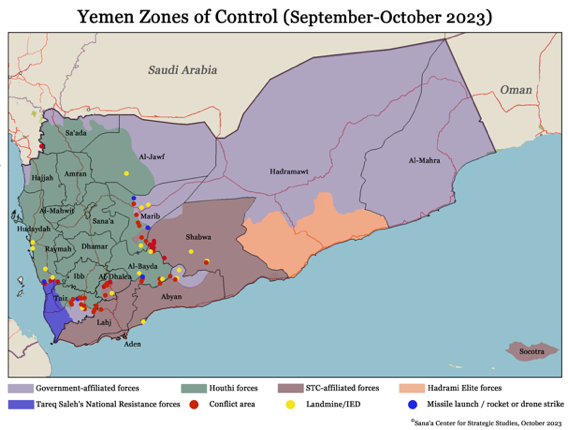
*
The Houthi Security and Intelligence Service (جهاز الأمنوالمخابرات) is one of the key intelligence agencies through which the terrorist group maintains its dominance of Yemen. SIS was formed in 2019 by merging two existing organizations known as the Political Security Office (PSO) and the National Security Bureau (NSB),* which may explain why it has such a broad remit today.
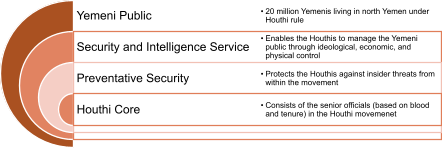
To achieve its end, SIS uses few carrots and many sticks.
Domestically, its responsibilities involve promoting recruitment into the Houthi military ranks, injecting Houthi ideology into the educational system and media, distributing essentials to favored segments of the population, overseeing infrastructure projects (much of which is paid for by international humanitarian organizations), promoting the return of displaced Yemenis who fled the Houthis, and organizing and participating in the Houthis' religious and political events. Its repressive activities against the Houthis' opponents include arbitrary detention, torture, and murder.
A recent report in Yemeni media indicates that the Houthis have established a new organization, known as Police Intelligence, which is meant to take on some of SIS's responsibilities.* The new repressive apparatus is allegedly led by Ali Hussein al-Houthi, son of the group's founder, Hussein al-Houthi, and the nephew of current chief Abdul-Malik al-Houthi. According to an October 2024 article in al-Masdar, Police Intelligence will be tasked with suppressing public dissent, while SIS remains responsible for tackling more acute threats to the regime.* The goal of this division of labor is to reduce SIS's massive workload, resulting from its broad responsibilities—though it remains to be seen how this separation will play out in practice.
Outside of Houthi-controlled areas, SIS seeks to promote the group's military aims by undermining anti-Houthi forces. There are claims based on a variety of reliable sources, including informant testimonies* and UN expert reports,* that SIS is involved in smuggling of weapons from abroad into Houthi-controlled territories, deployment of Yemeni saboteurs into "enemy" territory to destabilize areas controlled by the IRG, and collaboration with AQAP.
While this research was unable to determine the total number of the agency's personnel or the size or source of its funding, mapping its senior leadership and their activities establishes that SIS has at least four primary areas of activity:
- Engagement in domestic security issues to promote the stability of the Houthi regime. This effort is led by Mutlaq al-Marrani (Section III F).
- Targeting and diverting humanitarian aid, with which al-Marrani was also previously tasked, but which has been increasingly tackled by Mohammed al-Washli since 2023 (Section III D).
- Monitoring and controlling the domestic economy, run by Hassan al-Marrani (Section III E), although sometimes that intersects with al-Washli's portfolio.
- Overseeing the Houthis' shadowy economic activities abroad which include but are not limited to money laundering and weapons procurement. Mohammed Amer is charged with this responsibility.
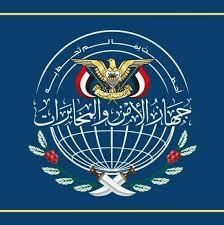
The SIS insignia includes the organization's name, "Jihaz al-Amnwa-al-Mukhabarat," in Arabic calligraphy over the center of a globe. Above that, the graphic includes the Yemeni government's emblem, a golden eagle of Saladin. At the top of the insignia there is a Quranic quote (27:22)relating to a story about Yemen and translating roughly to "I have found out something you do not know."
Abdul Hakim al-Khaywani heads SIS, and for the activities he undertakes in that capacity he has been sanctioned by the U.S. under the Global Magnitsky Act.* His senior deputies, including Deputy Chief Abdelqader al-Shami, Chief ofInternal Security Mutlaq al-Marrani, and Chief of External Operations Hassan al-Kahlani, have been sanctioned by theU.S. as well.* However, the organization's leadership is far larger than just four people, and this report has mapped out over 20 of the organization's top officials and their activities.*
As can be determined from their photos in the report, most SIS leaders do not attend public functions in uniform. Instead, they wear traditional dress, likely to maintain a low profile and as an expression of the fact that their primary operational environments are civilian. Despite the fact that many of the organization's senior officials carry military titles of general or colonel, SIS personnel are not members of a military organization and do not engage in combat. SIS Chief al-Khaywani, by contrast, is regularly photographed in military fatigues.
The organization's supervisor and Abdul-Malik al-Houthi's uncle, Interior Minister Abdelkarim al-Houthi,is not included in this report, as he is not technically part of the organization.* Additionally, advisors to senior SIS officials, such as Yahya al-Ahrmi* and Yahya al-Jawbi,* were not included in the organizational chart or the personnel dossiers.
The following section will elaborate on the figures who lead the agency on a national level, while later sections will identify key figures on the governorate level.
National Leadership
SIS Chief: Major General Abdulhakim "Abu al-Karrar" al-Khaywani
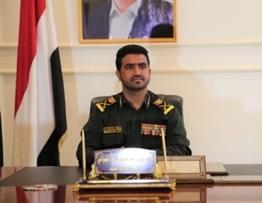
SIS Chief Abdulhakim al-Khaywani.*
Abdulhakim al-Khaywani is a longtime Houthi loyalist who assumed his role as chief of SIS in 2019 after serving as deputy interior minister. At the Ministry of Interior (MOI), al-Khaywani and his supervisor, Abulkarim al-Houthi, reportedly struggled for control until the latter had his deputy fired and even, allegedly, arrested.* This was likely a result of the changing internal dynamics in the ministry. Al-Khaywani managed to exert more internal influence than the previous minister, Muhammad al-Qawsi, despite formally serving as his subordinate, and so he may have incorrectly presumed that this balance would continue in 2017 after Abdulkarim al-Houthi replaced al-Qawsi.*However, regardless of the reported conflict within the MOI, al-Houthi and al-Khaywani parted ways in a public show of unity at the end of 2019, when the former presented the latter with "a certificate of gratitude and a shield of honor" in a ceremony held by the ministry to thank al-Khaywani for his service.*
Following this, it was no surprise that al-Khaywani took on the leadership of SIS with great zeal, as even during his tenure as deputy at MOI he sought to aggressively curtail citizens' rights. For example, following the breakdown of the Houthi-Saleh alliance in 2017, al-Khaywani called for the declaration of a state of emergency. His rationale for augmenting the powers of law enforcement and intelligence agencies was that doing so would "enable [them] to prosecute and convict criminals, and the different organizations of the state will work much better."*
According to the news website of the Yemeni Islamist party al-Islah, al-Khaywani is "considered primarily responsible for the file of kidnappings and arrests carried out by the Houthi militias against activists, opponents, and journalists."* That may be the case, but in practice he works on a much broader range of issues.
For example, al-Khaywani was among the few senior Houthi officials to meet with the Omani delegation visiting Sanaa in 2023 to discuss the prospects of a Saudi-Houthi peace deal.* Al-Khaywani was also a member of the board of SCMCHA, which oversaw (and aggressively sought to control) the influx of billions of dollars per year of humanitarian aid into Houthi-controlled areas. SIS worked hand in glove with SCMCHA to enhance Houthi intelligence on and power over aid organizations.*
SIS Deputy Chief: Major General Abdulqader al-Shami
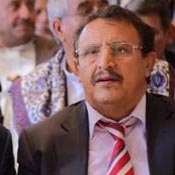
SIS Deputy Chief Abdulqader al-Shami.*
Abdulqader al-Shami is one of the few senior officials who successfully pivoted from the Saleh regime to the Houthis and continued to serve in senior posts following the collapse of the Saleh-Houthi alliance in 2017. According to a Yemeni news site, al-Shami has worked for the MOI since his graduation from college in 1972.* He served in the Saleh regime's intelligence apparatus, and was appointed director of political security in Abyan Governorate in 1990 and then to the same position in Lahj Governorate in 2001.* Several months after the Houthi march into Sanaa in September 2014, al-Shami became undersecretary of political security. Then, in 2019, he was named deputy chief ofSIS.
During his work in the southern regions of Yemen under President Saleh, some sources report that al-Shami had developed ties with AQAP. They claim that he then leveraged these relationships in order to develop a more cooperativeHouthi-AQAP relationship following his appointment to the role of deputy chief of SIS.* A January 2024 report published by the UN documented the warming Houthi-AQAP relationship, noting:
[AQAP] developed unmanned aerial systems capabilities, establishing a specialized drone unit, with operational training from the Houthis. [AQAP] prioritizes liberating its prisoners to replenish ranks; in September, the Houthis released several AQAP members and explosives experts.*
In recent years, as a result of the growing Houthi-AQAP ties, AQAP has refocused its efforts away from targeting the Houthi forces and toward attacking forces of UAE-backed Southern Transitional Council (STC) which operate under the umbrella of the Saudi-led coalition.*
Another possible result of al-Shami's background working for the Saleh regime is that al-Khaywani reportedly places his trust not in his deputy but in SIS Undersecretary Fawaz Nashwan. Al-Khaywani allegedly appointed Nashwan to run the organization during his temporary medical absence, which resulted in a dispute as al-Shami took his boss's decision as a personal affront that portrayed him as incompetent and untrustworthy.*
Undersecretary of SIS: Major General Fawaz Nashwan
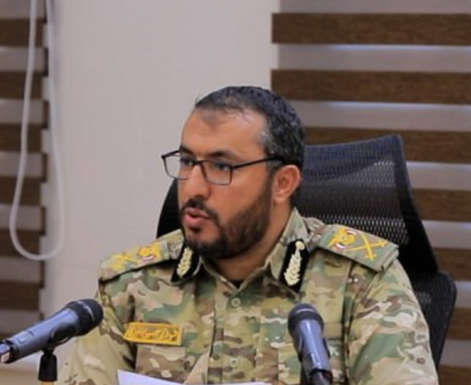
Undersecretary of SIS Fawaz Nashwan.*
Fawaz Nashwan worked as a pro-Houthi journalist until the Houthis took Sanaa in 2014. During that time, he wrote articles defending the movement and sought to discredit anti-Houthi media. Interestingly, it is possible that he may have been covertly serving in the nascent Houthi organization's intelligence services as early as 2011, because in a public internet forum, someone by the name of Fawaz Nashwan asked in Arabic about the utility of Google Earth for up-to-date visual intelligence.*
After the Houthis took Sanaa, Nashwan worked for Houthi intelligence to monitor the online activities of Yemenis. During this time he continued to promote the Houthi narrative in the media.* According to Sky News Arabia, Nashwan underwent training by Hezbollah in Lebanon and by the Islamic Revolutionary Guard Corps Quds Force (IRGC-QF) in Iran.* Eventually, Nashwan was appointed to lead the National Security Bureau (NSB), but his tenure in that role was brief due to the Houthis' restructuring of their intelligence services.* In 2019, he was appointed to serve as undersecretary of the newly formed SIS, which incorporated both the political security and national security agencies. According to some reports, Nashwan was appointed to the role of undersecretary after General Abdelrab "Abu Taha" Jarfan was removed from the position due to disputes with longtime Houthi loyalist and senior intelligence official Mutlaq "Abu Imad" al-Marrani.* * Nashwan's current activities appear to be largely secretive, though he is believed to be among the most senior officials in SIS, and he has been publicly cited for his involvement in developing defenses for the Houthis' critical infrastructure, such as the Sanaa airport.*
Undersecretary of SIS: Major General Mohammed al-Washli
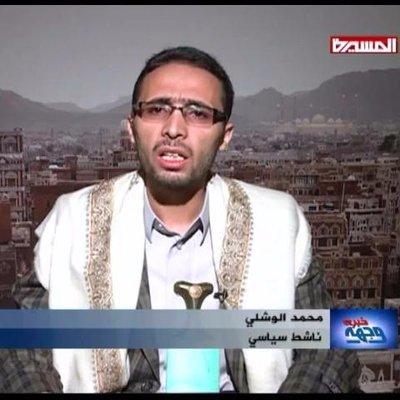
Undersecretary of SIS Mohammed al-Washli.*
Mohammed al-Washli first appeared in the media as a pro-Houthi political activist and journalist in 2014.* In his early years, he made several appearances on al-Masirah TV and wrote articles for Houthi-controlled news outlets like al-Hagiga.* Later in his career, he likely served as general manager of the Teachers' Affairs Bureau at the Ministry of Education* and/or director of the al-Sabaeen District in central Sanaa.* It is unclear exactly which one of the two roles al-Washli served in, and it is possible due to the favoritism for specific families/tribes that there is more than one senior official with that same name. However, given his experience as a propagandist and the Houthis' emphasis on indoctrination of Yemeni youth, it seems most likely that al-Washli served in the role in the Houthis' Ministry of Education.
The Yemeni organization Mayyun describes itself as "an independent Yemeni organization working in the field of defending and protecting human rights through (monitoring, documentation, reports, and victim advocacy)."* In November of 2023, Mayyun accused al-Washli of overseeing the detention, torture, and murder of Save the Children employee Hisham al-Hakimi.*
Khabar News Agency also alleged that al-Washli oversaw the forced disappearance of two elderly educators, Sabrial-Hakimi and Mujib al-Mikhlafi, who were detained by SIS in October 2023. The pair were reportedly charged with providing information for reports which accuse "the Houthis of committing a number of violations related to children in Yemen," presumably in the realm of indoctrination and recruitment of child soldiers.* According to a Yemeni government official, during the single visit that the detainees' families were allowed to make to their imprisoned relatives, visitors identified signs of torture on the detainees' bodies.* The United Nations Panel of Experts has since reported that Sabri al-Hakimi died in SIS custody, and his body was released to his family on 28 March 2024 on the condition that it be buried quickly and without any forensic examination.*
Undersecretary of SIS: Major General Hassan "Abu al-Hassan" al-Marrani

Undersecretary of SIS Hassan al-Marrani.*
As early as 2017, Hassan al-Marrani was appointed director of the Intelligence Department in the National Security Bureau.* In 2018, al-Marrani was also serving in the ostensibly benign role of director general at the Yemeni Economic Corporation. In this capacity, according to a leaked document, he worked to promote Houthi recruitment by calling "for the speedy preparation of lists of the names of employees who are ready to participate in the war and submitting them to administrative affairs for qualification, within three days."*
By 2019, al-Marrani was referred to by official Houthi media as an undersecretary for SIS as well as a member of the board of SCMCHA.* In 2020, he met with a "Yemeni NGO" known as the Bonyan Development Foundation in order to discuss how to expand the agricultural sector in Saada; Bonyan is known to serve as an Iran-based* front for the Houthi diversion of humanitarian assistance.*
In addition, al-Marrani is reportedly tasked with leading the "soft war" against Western culture in Houthi controlled areas. While that has not been confirmed by official Houthi media, an anti-Houthi Yemeni news site quotes al-Marrani's warnings to those violating Houthi extremist ideology as follows:
Anyone who listens to songs or recites flirtatious poetry and displays tempting mannequins in front of his shop, or imitates his female colleague at work or at university, must stop this sin immediately and declare repentance before the expiry of the exemption period at the end of this January, as we will be on the lookout for them.*
The multiple roles of Hassan al-Marrani sheds light on how the Houthi organization functions. The group does not base appointments on standard credentials or provide singular, clearly defined roles for senior officials. The fluidity and opacity of the organizational structure creates uncertainty regarding the particular responsibilities of each individual. This makes attributing personal accountability for actions, both in general but especially but by outside actors seeking to hold the group responsible for its malign activities, especially challenging.
Chief of SIS Internal Security Division: Major General Mutlaq "Abu Imad" al-Marrani
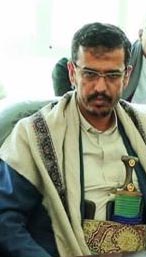
SIS Chief of Internal Security Mutlaq al-Marrani.*
Mutlaq "Abu Imad"* al-Marrani is one of the most infamous SIS officials. According to the Yemeni news site 4 May, al-Marrani began his work building intelligence cells for the Houthi rebels (under the guidance ofHezbollah) in 2006.* Following the Houthi takeover of Sanaa, al-Marrani rose to become deputy chief of the National Security Bureau and then acting chief. After the PSO and NSB were reorganized to form SIS in 2019, al-Marrani began wearing two hats: Chief of internal security in SIS and Director of SIS for the Saada province.*
Al-Marrani's work is highly significant for the Houthis for two main reasons. First, as chief of internal security, his responsibilities are extremely broad and have included a wide range of activities from targeting religious minorities in Yemen* to controlling and exploiting international humanitarian assistance efforts in Yemen.* Second, al-Marrani is also tasked with protecting the Houthi heartland of Saada, where the group's leader, Abdul-Malik al-Houthi, is believed to be hiding.*
The U.S. sanctioned al-Marrani in December 2020.* Washington alleged both egregious human rights abuses and corruption, noting that:
[Al-Marrani] oversaw detainees of the NSB, who were reportedly subjected to torture and other mistreatment by members of the NSB while detained. In addition, al-Marrani played a significant role in the arrest, detention, and ill treatment of humanitarian workers and other authorities working on humanitarian assistance and was also found to have abused his authority and influence over humanitarian access as leverage to generate personal profit.*
A Yemeni news site also alleged in 2018 that al-Marrani "receives large sums of money from the United Nations[World Food Programme] every month in exchange for transporting aid."* Despite being sanctioned by the U.S.in 2020, al-Marrani apparently continued to meet with aid organizations as recently as 2022.*
As part of his espionage work at SIS, al-Marrani has recruited Yemeni women to develop kompromat on the Houthis' targets. Yemeni activist Samia al-Houry noted in 2020 that al-Marrani was involved in "recruiting girls to spy on the activities of international organizations and United Nations employees."* According to AlArabiya, al-Houry accused al-Marrani of recruiting "dozens of girls, taking advantage of their need for money, and sent them to seduce the Houthis' opponents abroad. He also asked them to seduce tribal and political figures."*
In addition, al-Marrani engages in day-to-day efforts to promote the interests and ideology of the Houthis. He is involved in tribal mediation to prevent the perpetuation of destabilizing blood feuds,* and he is responsible for securing and attending major Houthi mobilization events in Saada governorate.* Al-Marrani has also worked to promote the boycott of Israeli goods among Yemenis, though in practice this has little impact, as Yemen has no trade relations with Israel and the Yemeni public has very little buying power for the types of high-end goods produced by a developed economy.*
In late 2023, al-Marrani was referred to as the "Representative of the Office of the Leader of the Revolution[Abdul-Malik al-Houthi]" by a Houthi media outlet, though it is unclear whether this is an additional role in which he serves the organization, an honorific title without any associated responsibilities, or a function he played at a specific event.*
Additional Undersecretaries & Department Chiefs of SIS
Undersecretary of SIS: Major General Mohammed "Abu Khalil" Amer
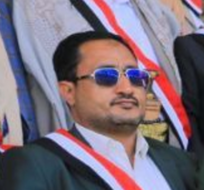
Undersecretary of SIS Mohammed Amer.*
SIS Undersecretary Mohammed "Abu Khalil" Amer initially appeared in Houthi media when he joined Deputy Chief Abdelqader al-Shami and Undersecretary Fawaz Nashwan in a visit to the family of the Houthi "martyr" Abdelqawi al-Jabri in December 2023.*
Reports published in the summer of 2024* allege that Amer leads the Houthis' covert economic activities, which include supervising a complex financial system to evade sanctions, launder ill-gotten gains, and fund the procurement and smuggling of weapons. Amer reportedly works closely on cultivating the Houthis' shadow economoly alongside Abdul-Malik al-Houthi's son-in-law, Abdulilah al-Hamran.*
Abu Khalil oversees senior SIS officials involved in developing and exploiting the Houthis' illicit financial networks. His subordinates reportedly include:
- The head of SIS's economic department, Khaled Mohammed Khalil, who works to collect "money and taxes from [currency] exchange companies and commercial companies operating in Yemen in general."*
- Abdullah al-Mutamayaz, who plays a lead role in SIS financial activities, including procurement and the purchase of real estate assets and other expensive properties for senior Houthi officials.*
Presuming that Amer is responsible for overseeing the Houthis' financial and procurement activities overseas, then there is good reason to suspect Chief of External Operations Hassan "Abu Shahid" al-Kahalani also serves under Amer.
Chief of SIS External Operations Division: Hassan "Abu Shahid" al-Kahlani
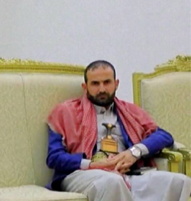
Chief of SIS External Operations Hassan al-Kahlani.*
In 2008, when the Houthi movement was still a marginal guerrilla organization operating in Yemen's periphery, Hassan al-Kahlani was sentenced by the Saleh regime to several years in prison for supporting the Houthi rebellion.* He was convicted of activities which included joining a Houthi cell that "carried out bombings and assassinations in the capital, Sanaa, after the killing of the group's founder, Hussein al-Houthi."*
Following his release from prison and the Houthi takeover of Sanaa in 2014, al-Kahlani served as assistant to the director of the Sanaa International Airport, where he worked in practice as the Houthi mushrif, or "supervisor," likely giving orders to his superiors in the airport authority's official hierarchy. Shortly after assuming his role at the airport, al-Kahlani's father, Ahmed al-Kahlani, was assassinated by unidentified gunmen.* In 2015, he also traveled to Tehran as a member of a Houthi delegation,* and he more recently received some media exposure for his participation in Saudi-Houthi negotiations.*
According to U.S. reports, al-Kahlani is now based in Iran, where he "facilitated Houthi weapons smuggling efforts" and "coordinated to conceal and transport Iranian lethal aid to Houthi forces."* For these activities relating to Houthi procurement, he was sanctioned by the U.S. in October 2024.*
Al-Kahlani's posting in Iran comports with the broader findings of the UN Panel of Experts that key Houthi procurement personnel are operating out of Iran. The panel's 2024 report noted that senior Houthi official Major General Muhammad "Abu Jaafar" al-Talibi worked in the Houthi offices in Tehran, where he "is in charge of the illicit shipment of materiel to the Houthis through a network of individuals and entities."* It alleged that al-Talibi is part of the two-person "liaison cell that coordinates and monitors transfers of materiel to Houthi-controlled area."*
Governorate-Level Leadership
Ibb
Director of SIS in Ibb: Brigadier General Zaid al-Muayyad
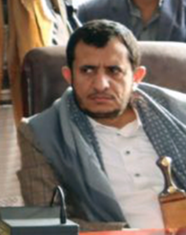
Director of SIS in Ibb Zaid al-Muayyad.*
Zaid al-Muayyad serves as the director of SIS in Ibb governorate, where the Houthis are reportedly taking especially brutal action because of the terror group's suspicion toward this border governorate inhabited by Sunni Muslims. There, the Houthis have allegedly promised amnesty to those who fled their rule, only for SIS to arrest and torture some who returned.* In another instance, Ibb-based activist Ibrahim Aqsin posted anti-Houthi materials on his popular social media site, which led SIS to not only seek to detain (and presumably torture) him but also put out an arrest warrant for his children.*
Al-Muayyad has demonstrated repeatedly that he runs Ibb like a mafia state. In one instance, a female relative of his was planning to marry a man of lower social status (based on bloodline), and al-Muayyad had SIS kidnap her in order to prevent the wedding.* In a separate case, when a Houthi affiliate was convicted of murder, al-Muayyad called the governor to ensure that the death sentence would not be carried out.*
Al-Muayyad previously served as director of SIS in Hudaydah,* where he is reported to have supervised the smuggling of arms via Hudaydah's several ports (Hudaydah, Ras Isa, Salif).* In addition, according to a testimony recorded in the Arabic press, Zaid al-Muayyad recruited spies to infiltrate the Yemeni government, and particularly the military; the report indicates that the spies recruited by al-Muayyad were responsible for some of the most high-level assassination attempts against Yemeni military officials, including a near-miss against the Yemeni military's chief of staff that resulted in the deaths of his son and nephew.*
Al-Muayyad was preceded in his role as director of SIS in Ibb by Brigadier General Muhammad "Abu Hashem"al-Dahyani.* Al-Dayhani likely served in the Houthi embassy in Tehran before ascending to his position as SIS Director in Ibb.* There is no available information concerning his current activities.
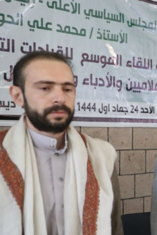
Former director of SIS in Ibb Muhammad "Abu Hashem" Al-Dahyani.*
Deputy Director of SIS in Ibb: Brigadier General Faisal Taher Sharian*
Little is known about the deputy director of SIS in Ibb except that in 2022 he participated in an official delegation inspecting medical facilities in the governorate, which Houthi media described as neglected.*
Hudaydah
Director of SIS in Hudaydah: Brigadier General Hassan Sawmaa
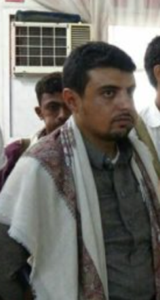
Director of SIS in Hudaydah Hassan Sawmaa.*
Like many of his SIS colleagues, Hassan Sawmaa spends considerable time and effort radicalizing the Yemeni public. Hehas appeared at public events promoting the Houthi "summer schools," which provide Houthi indoctrination and military training to young children. In a public speech, he described these indoctrination centers promoting "Knowledge and Jihad" as follows:
The fruits of the summer schools are evident in their outcomes for raising this generation in Quranic education, instilling faithful behaviors and principles of national belonging, and providing participants with skills to protect them from stray ideas, fight the soft war, and discover talents.*
To demonstrate the "benevolence" of the Houthis, he also participated in a number of "goodwill" events involving the early release of prisoners who were apparently not accused of anti-Houthi activities or crimes which "affected the security of citizens."*
Prior to assuming his current role at SIS, Sawmaa was the chief of criminal investigation in Hudaydah.* In that role, he opined in Houthi media on the ceasefire negotiations over Hudaydah port, praising what he termed Houthi gestures of good faith and decrying the Saudi-led coalition's intransigence.* Of course, in practice, theHouthis did not actually abide by the Hudaydah agreement, which required them to hand over the port to a neutral third-party and use the port's revenues to pay the salaries of government employees. Yet, the UN continues to fund some of the repairs and operating costs of the port,* which remains a vital artery of revenue and materiel for the Houthis.
Sawmaa's predecessor as SIS chief in Hudaydah, Zaid al-Muayyad,* was involved in the smuggling of weapons to the Houthi regime via Hudaydah's ports (Hudaydah, Ras Isa, Salif).* Therefore, it is likely that Sawmaais also engaged in such activities. In addition to his work as director of SIS for Hudaydah, Sawmaa is also referred to by some sources as director of the Counter-Terrorism Office in the governorate.*
Director of SIS for the Eastern Directorates of Hudaydah: Lieutenant Colonel (Abu) Badr al-Sahari*

Director of SIS for Eastern Directorates of Hudaydah Badr al-Sahari.*
Lieutenant Colonel (Abu) Badr al-Sahari appears to be primarily engaged in activities related to Houthi recruitment and mobilization via education. The majority of open-source references to his activities* concern public ceremonies or programs in schools which serve to promote Houthi ideology to the general public. Also, in an effort to promote social stability under Houthi rule, al-Sahari appears to have been involved in a process which capped the dowry prices for engagements/weddings in Hudaydah.*
Amran
Director of SIS in Amran: Hussein "Abu Mohammed" al-Khawlani
Hussein al-Khawlani* is also referred to by several other names, including "Mohammed" and "Abu Mohammed," all of which are likely referring to the same person because the individuals described have the same surname and occupy the same role at SIS—director in Amran. In this role, or at least what is publicly known about it, al-Khawlani takes part in ceremonial events such as those celebrating the Prophet Muhammad's birthday(mawlid)* and military graduation ceremonies.*
As noted by the Houthi outlet Saba News, al-Khawlani is also involved in broader cooperation with law enforcement to ensure "security and stability." SIS's role in that partnership is likely focused on targeting anti-Houthi activists and providing privileges to loyalists.*
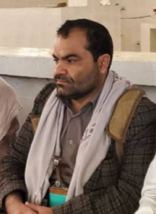
*Former director of SIS in Amran Majid al-Ayani.
The previous director of SIS in Amran was Majid al-Ayani.* Al-Ayani was engaged in the seizure of assets, including homes and private property of anti-Houthi residents of Amran who are deemed "mercenaries" in Houthi parlance; he did so in coordination with the Houthi justice system.* It is reasonable to assume that his successor as SIS director in Amran, al-Khawlani, continues such practices.
Al-Ayani also worked to mobilize the Yemeni public behind the Houthi flag. According to one article in Houthi-run media, during his posting in Amran, al-Ayani delivered a speech stressing "the importance of [Yemenis] devoting themselves to confronting [anti-Houthi] aggression and consolidating the victories of the army and the popular committees by continuing to mobilize the fronts and supporting the stationed personnel with men and money."* In addition, he participated in "educational" ceremonies at Amran University designed to promote radical Houthi ideology to the students, in events timed for holidays such as mawlid.*
Hajjah
Director of SIS in Hajjah: Brigadier General Adel al-Lahji
Adel al-Lahji is engaged in a variety of activities in Hajjah, ranging from popular mobilization to economic affairs.
In September 2023, al-Lahji attended an event celebrating the graduation ceremony of government personnel at the conclusion of an indoctrination course. This seminar was described by the Houthi press as a "cultural construction course for the governorate's security officers and personnel."* This program was apparently a cooperative project between the Hajjah Governorate Security Office and the General Administration ofTraining and Guidance at the MOI.
Later in 2023, al-Lahji participated in an event convened by the educational institutes of Hajjah (including the al-Razi* and al-Manar universities which he had inaugurated in June 2023*) on the importance of martyrdom.* In January 2024, he participated in the "al-Aqsa Flood Workshop" at al-Manar University.* Following that, al-Lahji was featured in a ceremony convened by the "Spend in the Way of God" jihadist association; according to Houthi media, this charitable association "aims to deliver God's guidance and light to all segments of society and to strive to advance jihad and cultural work, protect society from penetration by false cultures, and build a believing society that is aware of its role and responsibility before God."*
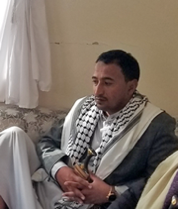
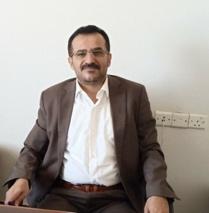
Left: Director of SIS in Hajjah Adel al-Lahji.*
Right: Adel Awadah, who served as Director of SIS in Hajjah until 2022.*
But al-Lahji's work is not limited to control of the information space. He and SIS also control the resources that Yemenis need to survive. He has been involved in overseeing the construction of roads,* water-related projects,* and monitoring markets in order to control the price and quality of goods;* given the nature of his role, he likely managed these efforts in ways that advanced the interests of the Houthi regime and its loyalists rather than broader Yemeni public.
Al-Lahji was preceded in this role by Brigadier General Adel Awadah,* who served until 2022.
Deputy Director of SIS in Hajjah: Lieutenant Colonel Jamal al-Hamdani
Little is known about Jamal al-Hamdani, who currently serves al-Lahji's deputy,* except that he has participated in a meeting to discuss how to convince those residents of Hajjah who fled Houthi rule to return.*
Dhamar
Deputy Director of SIS in Dhamar: Colonel Hamid Al-Ansi
As a member of Dhamar's "advisory committee," Hamid al-Ansi oversees the governorates academic institutions. In that capacity, he participated in a variety of "socially-minded" campaigns at Houthi-controlled universities. For example, al-Ansi took part in a local public cleanup effort entitled "Dhamar, the City of Awareness and Cleanliness" around al-Saeeda University* as well as a campaign to plant fruit trees around Dhamar University.* He also participated in an event celebrating short-story literature(in solidarity with Palestine) at Dhamar University.* Al-Ansi's publicized activities as a member of the "advisory committee" may be intended to distract from his role at SIS and enable his involvement in the humanitarian sector.*
As mentioned in CEP's previous report on humanitarian aid in Yemen,* SIS serves a key role in gathering intelligence on aid organizations and pressuring them to comply with regime demands. In al-Ansi's case, he is"head of the conflict resolution team" for a water project in Dhamar funded by the United Nations Development Program (UNDP) at a cost of nearly $500,000. At some point, the project was delayed due to an undisclosed conflict which was later resolved. It is probable that as head of the conflict resolution team, al-Ansi extracted resources from this project, presumably at least taking a salary for his role. Given the Houthis' usual modus operandi when dealing with international organizations, he likely imposed the regime's conditions for how the project must be executed.*
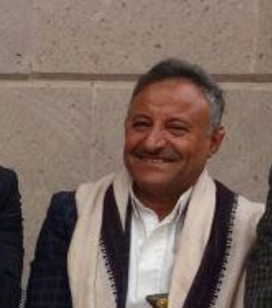
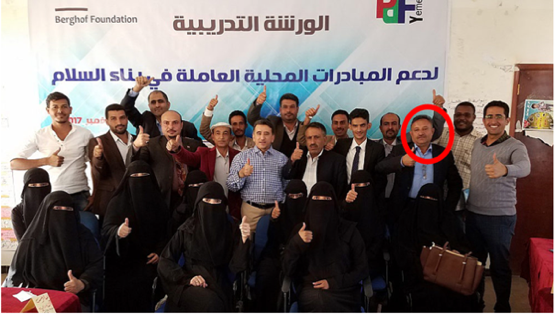
Left: Deputy Director of SIS in Dhamar Colonel Hamid Al-Ansi.*
Right: Encircled on the right side of the picture is Hamid al-Ansi giving a "thumbs up" at a 2021 Berghof Foundation event on inclusive governance.*
Al-Ansi also participated in the Berghof's Foundation's "inclusive governance" workshop in2021.* Several years later, in 2023, he was photographed attending a meeting with the head of the foundation's Yemen unit, Dalia Barsoum.* It is unclear if the foundation was aware of the participation of senior Houthi intelligence figures in these events.
Marib
Director of SIS in Marib: Brigadier General Mabkhout Tuaiman*
SIS Director in Marib Mabkhout Tuaiman has made several visits to the military front in Marib governorate (Sirwah) to inspect military positions, express gratitude to troops, raise morale by preaching Houthi doctrine, and present soldiers with holiday (Eid) gifts from the regime.* In addition, he appears to be involved in tribal politics and took part in the successful tribal mediation between the Tuaiman tribe from Marib and the Awadi tribe from Ibb in order to prevent an escalating blood feud.*
Interestingly, Tuaiman was also involved in efforts to sow chaos in the areas of Marib still controlled by the IRG. One detained would-be saboteur, Mushir al-Qahtani, was recruited when serving as a driver to the Houthi-appointed governor of Marib. According to al-Qahtani's 2021 testimony,* he was instructed to go to Sanaa, where he met SIS director Mabkhout Tuaiman, who promised to pay him large sums of money to destroy infrastructure in IRG-controlled areas of Marib. The aim of this plot was to displace the residents, sow confusion, and create the conditions for a successful Houthi attack. Al-Qahtani accepted the offer and was provided explosives and a bus. The former were his means to conduct the attack, while the latter would support his cover story as a bus driver in need of access to Marib.* The plot was foiled before it could be carried out.
Taiz
Director of SIS in Taiz: Sami Abu Talib*
According to United Against Nuclear Iran, Quds Day "is an annual day of protest organized by the Iranian government against Israel."* Houthi-controlled areas of Yemen have participated in this event in recent years, which provides yet another indicator of the group's growing commitment to the so-called Axis of Resistance. Sami Abu Talib was involved in orchestrating the Quds Day event in Taiz.*
Similarly, on mawlid, SIS in Taiz organized a celebration that included the participation of local Houthi officials. Abu Talib spoke at the event, extolling the work of SIS and exhorting the public to abide by Houthi religious and nationalist ideology. In addition, inmates from the SIS prison in Taiz put on a play (likely against their will)praising the Houthis in front of the attendees. According to Houthi media, the detainees' performance focused on "America's role in supporting ISIS and al-Qaeda, and how [Houthi] army forces, committees, and security and intelligence services confront these conspiracies."* Previously, Abu Talib has been accused of overseeing torture and personally making death threats against inmates in SIS prisons in Taiz.*
In the economic realm, Abu Talib is reportedly involved in determining how essentials such as gas (used for heating and cooking) should be distributed to Yemeni citizens in his area of responsibility.*
Sanaa
Director of SIS in Sanaa: Brigadier General Muntadhar al-Rashidi*
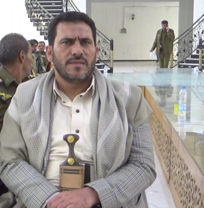
Director of SIS in Sanaa Muntadhar al-Rahidi.*
Muntadhar al-Rashidi is currently serving as the director of SIS in the key governorate of Sanaa. In this role, he reportedly attempted to demonstrate his commitment to the wellbeing of Houthi loyalists by visiting wounded members of the Houthi armed forces languishing in government hospitals,* as well as by checking in on the families of Houthi "martyrs."*
Like many of his colleagues, al-Rashidi attends events that promote Houthi indoctrination at educational institutions* and is engaged in efforts to convince those Yemenis who fled Houthi rule to return.*
As SIS director, al-Rashidi attends major Houthi promotional events like the grand opening of two new medical facilities in Sanaa (funded by UNICEF)*and the inauguration of a development project to build 20 new housing units.* This is likely part of a broader Houthi strategy which aims to take credit for the infrastructure work, much of which is funded by humanitarian aid organizations, while at the same time SIS extorts those very same bodies and persecutes their personnel.*
Al-Jawf
Director of SIS in al-Jawf: Brigadier General Taha Ali al-Sharif*
Very little is known about Taha Ali al-Sharif beyond media reports indicating that he serves as the director of SIS in al-Jawf. Although they share a name, it is unlikely that the director in al-Jawf is the same individual referred to in Houthi media as the head of special forces in Hudaydah.*
It is possible that the secrecy surrounding al-Sharif and his work is related to the end met by his predecessor.Major General Yahya al-Mutawakkil* served in the role of SIS Director in al-Jawf until he was assassinated along with two companions in June 2022.*
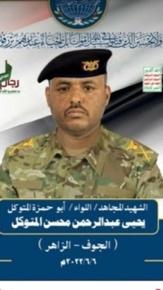
A Martyrdom Poster for the previous SIS chief in al-Jawf Yahya al-Mutawwakil published following his 2022 assassination.*
Al-Mahwit
Director of SIS in al-Mawhit: Brigadier General Muhammad al-Wajih
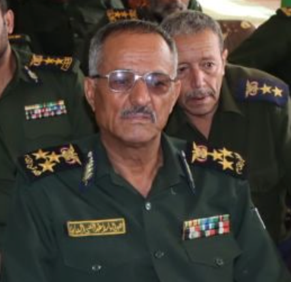
The individual suspected to be Muhammed al-Wajih, SIS Director in al-Mahwit.*
The extent of the information available about SIS Director in al-Mahwit Muhammad Al-Wajih is limited to the fact that the attended several events celebrating "martyrdom" on the anniversary of President Saleh al-Sammad's 2018 assassination.* Al-Wajih was preceded in his role as director of SIS in al-Mawhit by Colonel Zaid al-Shami.
Saada
Director of SIS in Saada: Major General Mutlaq al-Marrani*
See Section III E on Mutlaq al-Marrani.
Deputy Director of SIS in Saada: Colonel Taha Qashmar*
Little is known about Colonel Taha Qashmar beyond the fact that he attended a meeting in 2021 with senior judiciary officials in order to discuss the performance of the courts in the Saada governorate.
SIS Evolution: Maintaining Control Over Humanitarian Aid
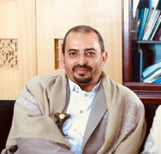
Abdelwahed Aburas, Former SIS Undersecretary of External Operation and currently serving as Deputy Foreign Minister.*
As mentioned above, the Houthi organization charged with controlling and diverting humanitarian aid to Yemen known as SCMHCA was disbanded in October 2024 and its responsibilities were transferred to the MFA and MLSA. SIS was a key partner to SCMCHA in collecting intelligence on humanitarian organizations and their activities as well as in enforcing regime demands on them. This is evident from SIS personnel's infiltration of aid projects, SIS detention of humanitarian aid workers, and SIS Chief al-Khaywani's appointment to SCMCHA's board.*
However, the disintegration of SCMCHA does not necessarily signal the end of SIS's involvement in controlling and diverting aid. In fact, less than two months before SCMCHA's responsibilities were transferred to the MFA, Abdulwahed Aburas was appointed deputy foreign minister.* Aburas previously served as SIS's undersecretary for external operations.*
Prior to assuming his senior role at SIS, Abdulwahed Aburas served as a Houthi field commander* during the uprisings against President Ali Abdullah Saleh (2006-2010). In the national negotiations on Yemen's political future following President Saleh's removal, known as the National Dialogue Conference (NDC), Aburas represented the Houthi organization and survived as assassination attempt in Sanaa.* After the NDC collapsed because the Houthis overran Sanaa, leaked recordings of phone conversations indicated Aburas coordinated efforts with former President Saleh to overthrow Yemen's transitional government.* * This highlights the fact that Aburas is a longtime Houthi loyalist and it appears unlikely that his repositioning in the MFA, which has been a far less influential organization than SIS, was an effort to sideline such a key regime figure. It is likely that his transfer to the MFA, which is now responsible for humanitarian aid coordination, created a new top-level link between SIS and the continued efforts by the Houthis to divert humanitarian aid following the end of SCMCHA.
Interestingly, the newly appointed foreign minister, Jamal Ahmed Ali Amer,* is not closely associated with theHouthi regime's most nefarious activities. Based on one conversation the author had with an informed source, Amer was apparently seeking asylum in the West at the time of his appointment to his ministerial post. Amer's selection to head the MFA may be intended to provide the organization with a more palatable face, while his die-hard Houthi deputy takes on the most essential portfolios of the ministry.
It remains to be seen how the disbanding of SCMCHA will impact the Houthis' aid diversion efforts, but it is plausible that former senior SIS official Abdulwahed Aburas will play a leading role in ensuring that any resources entering Houthi-controlled areas will be allocated to promoting the regime's interests.
Conclusion
This report provides an overview of SIS and its top-level national and provincial leadership, including 11 of the 15 regions over which the Houthis have complete or partial control. It is worth noting that the governorates in Raymah, al-Dhalea, al-Bayda, and the Capital Region ("Amanat al-Asima") were not included in this report, as there was no reliable information available about SIS leadership in those regions. As mentioned in the introduction, due to the secretive nature of SIS and the fact that this report is based on open-source intelligence, this report cannot attempt to outline in detail the covert activities of the organization. However, the data presented in this report can nevertheless serve as a foundation for more informed policies and future research on SIS.
As outlined in this report, numerous high ranking officials of SIS have reportedly been involved in the targeting of human rights workers, the radicalization of a generation of Yemenis (including children), the disruption of humanitarian projects in Yemen in order to reap personal financial gains, the Houthis' shadowy financial and procurement networks, and recruitment of agents to sow chaos and destruction in areas of Yemen controlled by the IRG.These individuals should, at the very least, be targeted through sanctions and cut off from access to the international financial system.
In addition, as noted here in the cases of Hamid al-Ansi and Muntadhar al-Rashidi and others, it seems that international organizations are failing to push back against SIS officials who exert control over their projects or take credit for them. While the humanitarian situation is quite delicate, as the Houthis hold their own people hostage and assign little value to human life, additional measures should be taken to detect and prevent SIS officials from coopting the activities of humanitarian organizations. A combination of tougher regulation targeting the Houthis and more rigorous transparency from the international organizations themselves (or third-party auditors) are necessary first steps.
 TOP
TOP